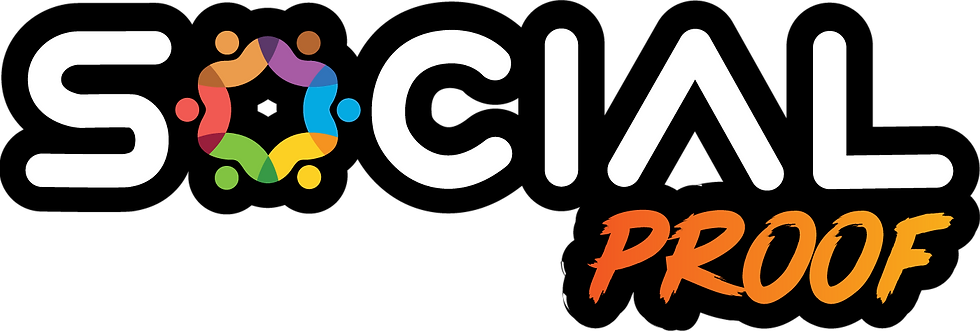What Is Tax Resolution?
- Lynnette René Doby

- Oct 13, 2022
- 7 min read
A Tale of Taxes Part 2 w/Tax Expert Sandra Morno
Entrepreneurs, we did it, we've made it to Q4!
As we end 2022 and 2023 approaches, one of the most important, yet dreaded, times is on the way, Tax Season.
Last week, we shared with you the dangers of ignoring your business taxes. Taxes are integral to your business's financial health that, as promised, we're doing a part two.
This time we brought in an expert, Sandra Morno, MBA, IRS Enrolled Agent of SSBM Consulting, to explain step-by-step what to do if you've ignored your taxes and need to catch up and file.
Whether it's been one year or ten, it's time to get right! Did you miss the part one of this blog series? Click below to check it out.
LET'S GOOOOO!
Make sure you bookmark this page and share it within your network!
SP: Thank you, Sandra, for taking the time to share this important information with the Social Proof Podcast audience!
SM: I enjoy sharing the information and hope it helps someone!
SP: It certainly will! Let's start with the basics. What is tax resolution?
SM: Tax resolution is done when someone or an entity is behind on their taxes. They need tax resolution services if they fall into one of these categories:
They haven't filed in years and they're getting audited by the IRS
They have a business and are having issues with their payroll taxes
Have a lien, a levy, or a wage garnishment
Any other type of issue with the IRS that they can't settle on their own
SP: Ahh, I see. I guess they realize it has to get done and hire an expert like you.
SM: Yeah. So unfortunately, a lot of times people wait until they've either tried it themselves or they're just overwhelmed. Or they get a revenue officer knocking on their door. So, one of the things I think people don't understand about the IRS is that they are very patient. If you communicate with them, they are okay. But if you straight up ignore them or you just think you're going to slide under the radar, you're sadly mistaken because they can come back like ten years down the line and be like, "Where you been?"
SP: Please explain the penalties the IRS charges for filing taxes late? Do penalties accrue per each year?
SM: Penalties and interest accrue daily. That is why, I usually tell people, stop waiting. Like if you know something's wrong or you have an issue, try to take care of it as soon as possible!
PRO TAX TIP: There's something called a first time penalty abatement. It's like a free get out of jail card. So, let's just say you owe $10,000 and $3,000 of that was penalty and interest. You can actually ask them, "Hey, can I use my first time get out of jail card?" and they'll let you know. A lot of the times the IRS approves. So you just saved yourself $3,000. But just remember, if you put yourself on a payment plan, the penalties and interest are still going to accrue.
SP: Wow, that's good! Thank you for that. A lot of people, like me, didn't know that.
You've done taxes with people for quite some time now. What do you think is people's hesitancy to file taxes? Specifically, how does someone get to the point where they just ignore their taxes?
SM: It's fear, because think about it. When you talk about taxes, people look like a deer in headlights. Am I right? They're like, oh, my no, I don't want to deal with it. And then time just goes by. I had a lady who literally hadn't filed in a decade, and she said she forgot. For other people, it is a lack of education and the fear of the IRS. They think to themselves, maybe if I don't file, the IRS won't come after me. But I always tell people, take it head-on because you don't want it to get to a point where they are garnishing your wages or they took all the money out of your account.
SP: Ouch, does that happen often?
SM: Yes, I've seen those things happened. I get baffled when I see it because I'm like, how do you let this happen? The IRS sends you mad notices.
SP: Good point. Could you please dispel one of the major myths surrounding taxes? For instance, I thought you had to file separately from your business, which is, of course, incorrect. What are some of the common myths that you have to correct while doing a client's taxes?
SM: I think when everyone starts a business, they start off as an LLC, right? And They think this is a major play and they are a separate entity. I have to tell the no. In the eyes of the IRS, you're considered a disregarded entity. This basically means you and your business are one until you actually separate yourself in either the form of a C-Corp or an S-Corp. As a single member LLC, you get hit with self-employment taxes. I advise my clients that the IRS will charge you, because you are the employer and the employee. So you're paying both ends and at the tax rate based on what you're making.
PRO TAX TIP: It's not how much you make, but it's how you make it. That's how these big companies don't pay a lot in taxes, but smaller businesses get penalized in taxes because they don't understand how they're taxed as a business.
SP: I like that. Let's stay there. I feel like this will benefit people, including myself. My understanding is, and please correct me if I'm wrong. Before you can become an S-Corp, isn't there a minimum revenue amount that you have to make?
SM: Well, not really. So with an S-Corp, the issue is you have to be an employee. So you have to make enough money with your company. You must be able to pay yourself some type of wage. It doesn't have to be grandiose, but it has to be something. That's one of the major ramifications of being an S-Corp.
PRO TAX TIP: As an S-Corp, you're totally separate from your company in the eyes of the IRS. You're filing Form 1120S, a corporation tax return. Then you're filing your personal 1040 with that. It's the same thing with a C-Corp. But as a single member LLC, you file 1040 and a form called a Schedule C.
SP: Interesting. Why do people become an LLC first, and not a C-Corp or S-Corp?
SM: It's ok to start as an LLC for the first couple of years of a business, if you're feeling it out. You are still learning about yourself and the business. Are you going to make enough money to pay yourself and will this be worth it?
I have a perfect example. When I started right, it was my sister and me in a partnership. I didn't know about S-Corps until I got my tax bill from IRS, and I was like, "Oh yeah, y'all play too much!"
My boss at the time told me to put myself on payroll and that will help me save on taxes. A light bulb went off in my mind! So on paper, according to the State of Florida, I'm an LLC, but in the eyes of the IRS, we are an S Corp. That's the most important thing that matters. How am I being taxed? And you save so much money on that. I tell people when you look at your taxes, look at your 1040 form, there is a line that says self-employment taxes and that is where you will see your penalty.
SP: What are some things other than filing on time and using the right designation that people can do to make sure that they don't face the wrath of the IRS?
SM: Have some type of accounting system or spreadsheet always available to you. You need to be looking at that at least once a month, so that, so you'll know the details about your money? What's that net income looking like? Because that's what you're getting taxed on.
I also usually tell people to tax plan.
Because we've got most of the year underway, look at how much money you're going to make. It may make sense for you to advise your clients that you will invoice them in 2023, to keep your net income low as you close the year.
There are a lot of little strategies that come into place during this final fourth quarter. It's kind of like our fourth quarter of a football game, right? This is when it all counts. That is why having that accounting system is so important. Having a tax preparer or tax professional that you can talk to and ask questions who can help you tax plan is extremely important.
One more suggestion: stop co-mingling your accounts. Please make sure you have a business account because when you start diving into personal and business accounts, it's it gets it gets really mucky. If you ever get audited, the IRS will not like if business funds are in your personal account.
SP: Wonderful, thank you for that. And share with me, please, without stating any proprietary information, what was the worst-case scenario you've seen in your career related late filing and IRS penalties?
SM: It was someone who had 1099 income, hadn't filed and somewhat ignored all the letters, and then had to come to the tax resolution company that I worked for at the time. The IRS had just wiped his bank account like and taken $25,000 out of his business bank account and he wanted to get it back. The only way to get that back from the IRS is if, unfortunately, you are homeless, and you need that money so you can survive. He couldn't do that. So we had to tell him that's just a $25,000 deposit on what you owe. Another big mistake is people I don't realize the IRS is serious until it's too late.
SP: If that isn't something to teach you a lesson, I don't know what is. Thank you so much for your great answers! I'd love for you to share some final words of wisdom.
SM: I really want to tell people, if they're having tax issues, just nip it in the bud. You hear all these commercials about the Fresh Start program and this and that. Find somebody to help you. Do your research. There are tax preparers out there willing to help you with tax resolution and tax planning. There's a lot of us out there that don't want to see people that look like us pay more than they need to in taxes. So find that person who's going to be available to you all year long, because that's what it's all about, getting that help all year long.
SP: Wonderful. Thank you so much for that. And lastly, where can people find you in addition to your LinkedIn? If they would like to work on their tax resolution.
SM: They can visit my website. Also, for the Social Proof Audience, I am offering free for 15 minutes consultations. They will complete an assessment before, so when we get on the phone, we get to business. Also, I am offering a 10% discount on my Tax Resolution services and my bookkeeping services.






Comments